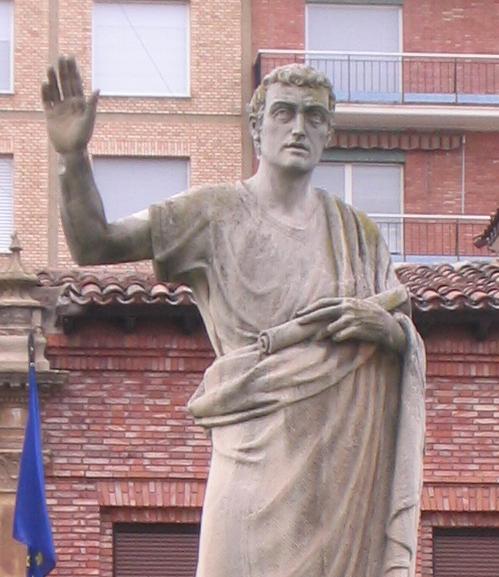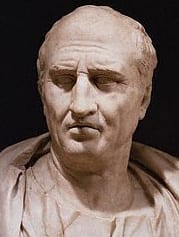Statues of Quintilian and of the older Cicero, the greatest orator of the Roman era.
Rhetoric, the ancient art of persuasion and dissuasion, was a staple of ancient education with the study of the progymnasmata or early exercises in rhetoric, beginning already in early education along with the learning of grammar and literature, and then when the student was ready for more advanced training he went on to study rhetoric in greater detail. This was because, the Greco-Roman world involved oral cultures where the living voice was preferred to the written text (as Quintilian in fact makes clear in the following excerpt from Book 2.4ff of his Institutions of Oration). Notice as well his profound concern for the moral formation of the boys he is training, with an especial concern to not allow older boys to engage in the grooming of young boys for pederastic encounters. He wants the older boys kept separate for those who had barely become a teen. Notice as well his concern to prevent sycophantic behavior, and his insistence that the teacher must model the very best behavior himself. Finally, notice that Quintilian insists that education in rhetoric is not a matter of age, but rather whenever the boy is ready and fit to receive such teaching. This is an important point because it means that we should not be too rigidly separating elementary from more advanced training in rhetoric as if these were divided according to age group. No, the divisions were according to ability and fitness for further training, and in many schools the classes would be of mixed ages from boys barely reaching puberty to young men, as Quintilian says.
—-
“A further point into which we must enquire concerns the age at which a boy may be considered sufficiently advanced to profit by the instructions of the rhetorician. In this connexion we must consider not the boy’s actual age, but the progress he has made in his studies. To put it briefly, I hold that the best answer to the question “When should a boy be sent to the school of rhetoric?” is this, “When he is fit.” 8 But this question is really dependent on that previously raised. For if the duties of the teacher of literature are prolonged to include instruction in deliberative declamation, this will p209 postpone the need for the rhetorician. On the other hand if the rhetorician does not refuse to undertake the first duties of his task, his instruction will be required from the moment the boy begins to compose narratives and his first attempts at passages of praise or denunciation. 9 We know that the orators of earlier days improved their eloquence by declaiming themes and common-places2 and other forms of rhetorical exercises not involving particular circumstances or persons such as provide the material for real or imaginary causes.3 From this we can clearly see what a scandalous dereliction of duty it is for the schools of rhetoric to abandon this department of their work, which was not merely its first, but for a long time its sole task. 10 What is there in those exercises of which I have just spoken that does not involve matters which are the special concern of rhetoric and further are typical of actual legal cases? Have we not to narrate facts in the law-courts? Indeed I am not sure that this is not the most important department of rhetoric in actual practice. 11 Are not eulogy and denunciation frequently introduced in the course of the contests of the courts? Are not common-places frequently inserted in the very heart of lawsuits, whether, like those which we find in the works of Cicero, they are directed against vice, or, like those published by Quintus Hortensius, deal with questions of general interest such as “whether small points of argument should carry weight,” or are employed to defend or impugn the credibility of witnesses? 12 These are the weapons which we should always have stored in our armour ready for immediate use as occasion may demand. The critic who denies that p211 such matters concern an orator is one who will refuse to believe that a statue is being begun when its limbs are actually being cast. Some will think that I am in too great a hurry, but let no one accuse me of thinking that the pupil who has been entrusted to the rhetorician should forthwith be withdrawn from the teacher of literature. 13 The latter will still have certain hours allotted him, and there is no reason to fear that a boy will be overloaded by receiving instruction from two different masters. It will not mean any increase of work, but merely the division among two masters of the studies which were previously indiscriminately combined under one: and the efficiency of either teacher will be increased. This method is still in vogue among the Greeks, but has been abandoned by us, not perhaps without some excuse, as there were others ready to step into the rhetorician’s shoes.
2 1 As soon therefore as a boy has made sufficient progress in his studies to be able to follow what I have styled the first stage of instruction in rhetoric, he should be placed under a rhetorician. Our first task must be to enquire whether the teacher is of good character. 2 The reason which leads me to deal with this subject in this portion of my work is not that I regard character as a matter of indifference where other teachers are concerned, (I have already shown how important I think it in the preceding book), but the age to which the pupil has attained makes the mention of this point especially necessary. 3 For as a rule boys are on the verge of manhood when transferred to the teacher of rhetoric and continue with him even when they are young men: consequently we must spare no effort to secure p213 that the purity of the teacher’s character should preserve those of tenderer years from corruption, while its authority should keep the bolder spirits from breaking out into licence. 4 Nor is it sufficient that he should merely set an example of the highest personal self-control; he must also be able to govern the behaviour of his pupils by the strictness of his discipline.
5 Let him therefore adopt a parental attitude to his pupils, and regard himself as the representative of those who have committed their children to his charge. Let him be free from vice himself and refuse to tolerate it in others. Let him be strict but not austere, genial but not too familiar: for austerity will make him unpopular, while familiarity breeds contempt. Let his discourse continually turn on what is good and honourable; the more he admonishes, the less he will have to punish. He must control his temper without however shutting his eyes to faults requiring correction: his instruction must be free from affectation, his industry great, his demands on his class continuous, but not extravagant. 6 He must be ready to answer questions and to put them unasked to those who sit silent. In praising the recitations of his pupils he must be neither grudging nor over-generous: the former quality will give them a distaste for work, while the latter will produce a complacent self-satisfaction. 7 In correcting faults he must avoid sarcasm and above all abuse: for teachers whose rebukes seem to imply positive dislike discourage industry. 8 He should declaim daily himself and, what is more, without stint, that his class may take his utterances home with them. For however many models for imitation he may p215 give them from the authors they are reading, it will still be found that fuller nourishment is provided by the living voice, as we call it, more especially when it proceeds from the teacher himself, who, if his pupils are rightly instructed, should be the object of their affection and respect. And it is scarcely possible to say how much more readily we imitate those whom we like.
9 I strongly disapprove of the prevailing practice of allowing boys to stand up or leap from the seats in the expression of their applause. Young men, even when they are listening to others, should be temperate in manifesting their approval. If this be insisted upon, the pupil will depend on his instructor’s verdict and will take his approval as a guarantee that he has spoken well. 10 The worst form of politeness, as it has come to be called, is that of mutual and indiscriminate applause, a practice which is unseemly, theatrical and unworthy of a decently disciplined school, in addition to being the worst foe to genuine study. For if every effusion is greeted with a storm of ready-made applause, care and industry come to be regarded as superfluous. 11 The audience no less than the speaker should therefore keep their eyes fixed on their teacher’s face, since thus they will learn to distinguish between what is praiseworthy and what is not: for just as writing gives facility, so listening begets the critical faculty. 12 But in the schools of to‑day we see boys stooping forward ready to spring to their feet: at the close of each period they not merely rise, but rush forward with shouts of unseemly enthusiasm. Such compliments are mutual and the success of a declamation consists in this kind of applause. The p217 result is vanity and empty self-sufficiency, carried to such an extent that, intoxicated by the wild enthusiasm of their fellow-pupils, they conceive a spite against their master, if his praise does not come up to their expectation. 13 But teachers must also insist on receiving an attentive and quiet hearing from the class when they themselves declaim. For the master should not speak to suit his pupil’s standard, but they should speak to suit his. Further he should, if possible, keep his eyes open to note the points which each boys praises and observe the manner in which he expresses his approval, and should rejoice that his words give pleasure not only for his own sake, but for that of those who show sound judgment in their appreciation.
14 I do not approve of boys sitting mixed with young men. For even if the teacher be such an one as we should desire to see in charge of the morals and studies of the young, and can keep his youthful pupils under proper control, it is none the less desirable to keep the weaker members separate from the more mature, and to avoid not only the actual charge of corruption but the merest suspicion of it. 15 I have thought it worth while to put my views on this subject quite briefly. For I do not think it necessary even to warn the teacher that both he and his school must be free from the grosser vices. And should there be any father who does not trouble to choose a teacher for his son who is free from the obvious taint of immorality, he may rest assured that all the other precepts, which I am attempting to lay down for the benefit of our youth, will be absolutely useless to him, if he neglects this.”














